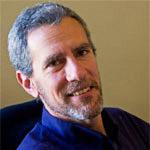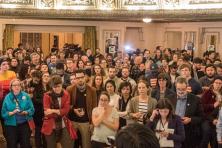God, grant me the serenity to accept the things I cannot change,
The courage to change the things I can,
And the wisdom to know the difference.
— Reinhold Niebuhr
Sign up to receive climate action alerts and updates!
Why do we call this “The Serenity Prayer”? It asks for three things: serenity, courage, and wisdom. Why do we remember only the soothing one?
It’s easy to assume – and the fossil fuel industry works overtime to ensure – that the climate crisis falls into the “things I cannot change” category. And for an awful lot of people in the world, that may be true. These are the people who have no economic opportunity or energy service or political power. Their carbon footprint is negligible. They do the least to cause climate disruption and suffer the worst of its impacts.
But those people don’t have the luxury of serenity, living as they do on the economic margin and the frontlines of climate devastation – in the Philippines, in the island nations, in North Africa, in the Lower Ninth Ward – where climate disruption is already wreaking havoc. Nor can they afford for the people who could actually win solutions to indulge in serenity while knuckling under to climate-destroying schemes like Arctic drilling.
Consider the Seattle Times editorial on May 13, criticizing the Port of Seattle for suggesting that its tenant ought to have a legal shoreline permit from the City in order to use Port facilities to host Shell’s Arctic drilling homeport.
“What’s at stake on the Seattle waterfront is not Arctic drilling or the fate of the Earth’s climate. The drilling is proceeding with the blessing of President Obama, to the dismay of environmentalists who supported him and fear the worst. In Seattle, what’s now at risk is the future of its maritime industry. That industry requires a port that functions as a reliable, open, agnostic, nondiscriminatory platform, on which companies can run their businesses.”
Why such righteous indignation about a trumped up threat to Seattle’s maritime industry and such dismissive serenity when it comes to the future of humanity? Wouldn’t it be wise to ensure that this “agnostic, nondiscriminatory platform” remains above water?
Scientists have clearly demonstrated that Arctic drilling is inconsistent with climate scenarios that support stable human civilization. But the Times seems serene about the Obama Administration’s gutless “conditional approval” of Shell’s exploration plan, suggesting no consequence greater than “dismay of environmentalists who supported him and fear the worst.” It’s as if this were just a petty political game, rather than what it is: an oil company lunging toward climate chaos, and a federal agency failing to protect us from it. Shell got their hooks deep enough into the federal Bureau of Ocean Energy Management (shocking, I know) to get their exploration plan “conditionally” approved. Are we supposed to accept this as a fait accompli, despite the devastating consequences, and use our public waterfront to abet it?
The community and our elected leaders aren’t questioning the Polar Pioneer because we oppose commerce. We’re questioning it because it’s on its way to perpetrating a human disaster, a disaster we can fully anticipate. And it hasn’t happened yet, so now is the time to have the conversation. This isn’t a “political” test for cargo; there is no prospect or implication of that. The biggest threat to the viability of the working waterfront in Seattle isn’t kayaktivists or the efforts of our local electeds to stand up for the community; it’s Shell bullying its way in here, commandeering the waterfront, and poking a sharp stick in the community’s eye.
Let’s concede that this battle over Shell’s sublease at the Port is not the ideal, most effective way to deal with climate change. Far worse than docking without a legal permit, the fossil fuel industry has mauled our democracy to obstruct comprehensive and rational solutions, like carbon limits and clean energy transition policies. We should live in the rational world where these things are possible.
But, c’mon, this isn’t about Arctic drilling or the Earth’s climate? Why does the Times think everyone’s up in arms – just to annoy the maritime industry? What do they think the Polar Pioneer is for?
I get why the Times or the Port or anybody doesn’t want to think the “fate of the Earth’s climate” is on them. But this is like going to the zoo and seeing the gate to the tiger’s cage is open and the tiger is eyeing your kid and you think, “Hmmm. Now, I’m not the zookeeper; it’s not my job to close the gate. It’s a slippery slope; think of what could happen if I just indiscriminately ran around closing and opening whichever gate I want.” The analogy is silly but not sensational – that rig really is a dangerous predator to our kids. The world would be a more serene place if we could safely ignore that. But that’s not how the intergenerational contract works.
So enough already with the serenity. The Polar Pioneer poses a grave threat. It contradicts our best economic strategy, our successful focus on sustainable prosperity, and the Port’s commitment to be a Green Gateway. By undermining public support for the Port, it jeopardizes the investments and local policies needed to prevent gentrification and protect good family-supporting jobs on a working waterfront for the long haul. It undermines our hard-won climate progress. It would increase and “lock in” fossil fuel dependence when we need to be investing in freeing ourselves from it. It would sustain the concentrated economic and political power of the fossil fuel industry over our democracy. (Muscling in to the Seattle waterfront with virtually no public review is a case in point. Acting as though it’s our fault for consuming oil while they block solutions is another.) By accelerating destabilization of the climate, it would threaten many of the important contributions Seattleites have made to global health and poverty reduction. It’s an unconscionable and still preventable disaster in the making. Will we be bullied into serving as a homeport for this?
Is serenity really the best we can do here?





